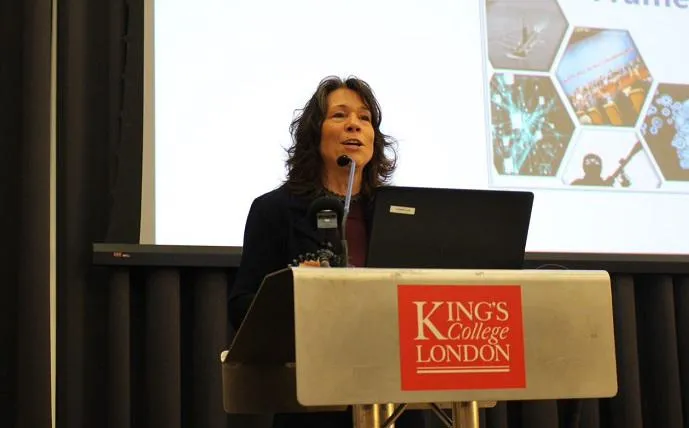25 January 2019
The NATO Alliance - How do you decide on the deterrent when you do not know the intent?
King’s hosted the NATO Symposium on Deterrence and Assurance within an Alliance Framework on 17th - 18th January attended by staff, students and members from NATO Nations and Partner Nations.

Professor Wyn Bowen, Head of the School of Security Studies referred to the partnership between King’s and NATO stating, “this event is part of the process of appreciating the deeper challenges and opportunities to use research to operate effective deterrence”. Professor Bowen highlighted the long history that the School has of “working in the deterrence and assurance (D&A) space as academics and trying to provide policy relevant insights in this area, investing in intellectual capital, trying to understand the recent and current emerging challenges the western alliance is having to confront with the resurgence of the great powers competition that we are seeing.”
The keynote address on Day 1 was given by Dr Kori Schake, Deputy Director-General, International Institute for Strategic Studies. Dr Schake oversees the Institute’s world-class research programme and acts as a driving force behind initiatives to enhance the Institute's work and profile. She has worked with both the military and civilian staffs of the Pentagon, in the White House at the National Security Council, and at the US State Department as Deputy Head of Policy Planning.
In her speech Dr Schake highlighted what she sees as deterrence, “to sum up deterrence as if you have the means to hold at risk something that the adversary values, is the essence of deterrence. I can damage something you value so much that you will voluntarily avoid taking what you want from me or damaging what I value”. Dr Schake referred to German rearmament after the First World War and the Berlin Crisis of 1958 and 1962 as periods that demonstrate this.
On Day 1 the three panels of speakers discussed new theories on D&A, how it works in practice and lessons learned, with representatives from the US Air Force Institute of Technology, the National Defence Academy of Latvia, Operations Division at NATO HQ, the University of Nebraska and NATO Allied Maritime Command.
On Day 2 the keynote address was given by Brigadier General Jasper De Quincy Adams, Director Comprehensive Crisis and Operations Management Centre, Supreme Headquarters Allied Powers Europe NATO (SACEUR). He completed three tours in Iraq (Op TELICs 5, 8 and 11). Subsequently he was posted to the UK's Permanent Joint Force Headquarters (PJHQ) before deploying to Afghanistan (Op HERRICK 10 and 11) as the mentor to the Helmand Provincial Chief of Police, establishing the Police Mentoring Advisory Group. His recent work at the UK Ministry of Defence in Army Resources and Plans, a short spell as the Task Force Ukraine Team leader at SHAPE and two years as a Special Advisor to the Chairman of the NATO Military Committee.
Brigadier de Quincy Adams spoke of concerns of a resurgent Russia and the rise of international terrorist groups. He emphasised that NATO faces the challenge of understanding the intent behind activities and mounting capabilities. “The outcome of this 2-day event can only make my organisation better… challenge, diversity of thought which we welcome only bring a far more comprehensive approach to the pieces we are talking about, can only be a good thing.”
He concluded that the pace of change in the NATO Alliance in the last 4 years has been “so quick that frankly we need a lot of the help from people who are young, bright and can come up with new ways of looking at the challenges we face.” The Brigadier also emphasised the positive rewards of Wargaming and running simulations “to see what the likely consequences of our actions were going to be.”
This research activity is a multi-national initiative and supported by the STO’s Collaboration Support Office. It is supervised by the System Analysis and Studies (SAS) Panel; the NATO Science and Technology Organization’s (STO) expert analytical advice panel. It decides on studies, analysis and information exchange activities that explore how operational capability can best be provided and enhanced through the exploitation of new technologies, new forms of organization or new concepts of operation. Such studies serve to improve National and NATO doctrine, and when costs are considered, provide advice on the most cost-effective options for the Alliance.
The keynote speeches by Dr Schake and Brigadier de Quincy Adams are available on our Soundcloud channel at https://soundcloud.com/warstudies/sets/events
